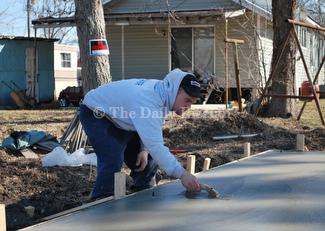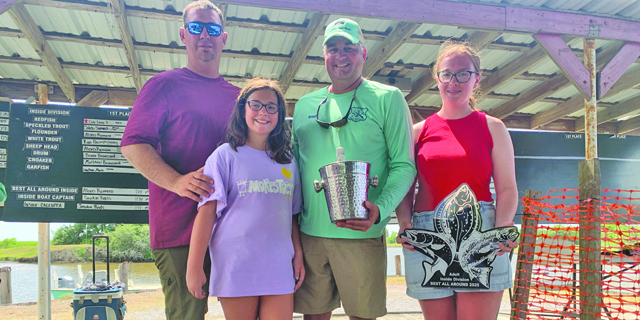Transitioning
Published 12:00 am Sunday, January 16, 2011

- Tyler Miller of Hartville, Ohio, smooths cement on foundation of a home being built in the West End. — Patrick Flanagan / The Daily Iberian
By transitioning from hurricane to community recovery, two New Iberia groups are paving the way for the oft-talked about revitalization of the West End in New Iberia.
After hurricanes Rita, Gustav and Ike pounded the western portion of Louisiana, including the Teche Area, the Southern Mutual Help Association and the First United Methodist Church of New Iberia each pooled their resources and took initiatives to help residents reeling from the natural disasters.
Trending
Now, as hurricane recovery efforts have wound down, both groups have refocused their initiatives to economic recovery of the West End.
Although their efforts in the West End are separately funded, both groups hold the same idea: Rebuild an area of the city that for decades has slipped slowly into economic decay.
“This is the first new construction in this part of town in a long time,” Bud Lee of New Iberia said as he stood outside a home being renovated on Roberston Street.
That home, along with two other abandoned properties on Robertson Street, were purchased recently by the Methodist Church in an effort to provide housing for people who otherwise could not afford it, said Lee, who is a member of the Methodist Church.
While watching the work being done Thursday afternoon to the home on Robertson Street, Lee said the crew of 15 workers from the Mennonite Disaster Service was an unexpected windfall.
“They just appeared,” Lee said.
Trending
“The Mennonites had an extra crew they sent us, and they just arrived at the right time.”
Scott Bullock, First United Methodist Church in New Iberia pastor, said the properties originally were scheduled for demolition by the city, but were purchased for about $70,000 by the church before being demolished.
Bullock said the initiative in the West End was borne out of the church’s efforts to help Iberia Parish residents, mostly in Delcambre, recover from the destruction caused by the last three major hurricanes to hit the area.
“Once our hurricane recovery efforts started to taper off, we thought we could put all these skills, teams, and resources we have into community housing,” Bullock said. “What we’re doing is parallel to what Habitat for Humanity tries to do — provide home ownership for the working poor.”
While the church sold one of the three properties to Habitat for Humanity, Bullock said the church’s goal is to rehabilitate the two remaining properties within the year.
“There are some really good families on the poverty line who live in a dilapidated rent house when they could be owning something and working there way up,” he said. “We’re not looking to make money on this. We’re just trying to get our money out of it and work with the families to be able to own something with no interest.”
Several blocks away, on the other side of Hopkins Street, another crew of Mennonite workers were hard at work building five homes for the local nonprofit Southern Mutual Help Association on Field, Lombard and Courrege streets.
One Mennonite worker, John Hershberger, who has 15 years experience in construction, said the five homes are all new constructions being built from the ground up by the various work crews being sent by the Mennonite Church, including workers from Ohio, Pennsylvania, and Canada.
“Southern Mutual provides the material and we provide the labor for free,” said Hershberger, who is from Hartville, Ohio.
Hershberger said the Mennonite Church has been involved in similar projects for the past seven years.
Paul Miller, another member of the Mennonite work crew from Ohio, said it’s a Mennonite tradition to provide support to those in need, whether it be sending supplies to countries affected by disaster like in Haiti, or helping build homes for the less fortunate as the case in the West End.
Southern Mutual President and CEO Lorna Bourg said the work being provided by the Mennonites will help cut the resale cost of the homes when they are sold to families in the West End community.
Bourg said the Mennonite work crews will arrive in waves, and while the current group has an expertise in laying foundations, the next group to arrive will specialize in house framing, which will be the next step in the project.
“We’re also raising dollars to lower that price even more to make it very conducive for residents wishing to buy homes and live in a redeveloping community,” Bourg said.
Each of the five 1,525 square-foot homes are being built at a cost of $96,000, and will be sold to families with a desire to participate in the overall initiative to revitalize the West End, Bourg said.
“We’re looking at families that have a sense of wanting to help build the community and are please to participate in the rebuilding of this community,” she said.





